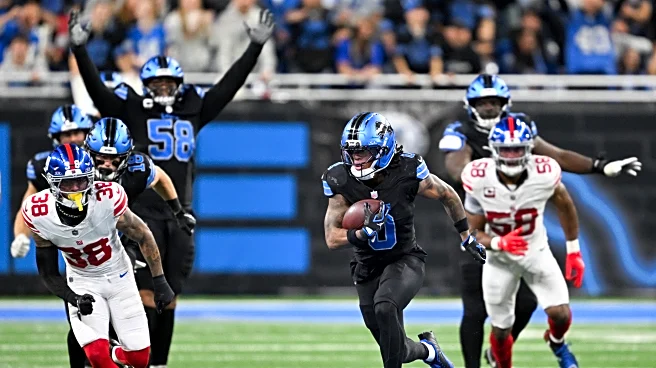The Detroit Lions’ win was anything but satisfying, but it did end with undeniable relief. Detroit returned to its gritty wheelhouse and outlasted the New York Giants in a game where they trailed for 57
minutes and 28 seconds — the most they’ve trailed in a game in the Dan Campbell era (83 games, including playoffs). The Lions have trailed for at least 48 minutes in 15 games under Campbell, and this was the only one they’ve successfully pried away from the clutches of defeat.
The Giants, playing without their QB1, RB1, and WR1, threw the kitchen sink at Detroit. They battled their butts off, landed the first punch, scored on two trick-play touchdowns, and dragged the Lions into overtime only to lose another one-score game—very reminiscent of those gritty 2021 Detroit Lions who punched above their weight many weeks.
The extra football on a short week with the Green Bay Packers looming on Thanksgiving could prove costly. Being dragged into the deep end by a frisky, wounded New York football team was far from ideal and the stock report—full of fallers—reflects that reality. And for Detroit, the takeaway is simple: more than ever, they need their core players to elevate down the stretch.
Stock up: Jahmyr Gibbs, RB
Gibbs delivered a performance worthy of folklore—full-on Simba saving Pride Rock levels of heroism. He was the best player on the field and produced one of the most dominant games by a Lions running back this century, and one of the best by any Lions skill player in franchise history.
A week after accounting for 41.9% of the team’s receiving yards, Gibbs led the team in receptions and accounted for 51.2% of Detroit’s total yards from scrimmage. His career-high 264 scrimmage yards were the third most in franchise history—more than Barry Sanders ever recorded in a game—and his 219 rushing yards made him just the second Lion ever (along with Sanders) to eclipse 200 rushing yards in a game. An incredible 145 of those 219 yards were rushing yards over expectation per Next Gen Stats.
Gibbs is a steroid-era slugger as a homerun threat. He made the most of every touch, recording three explosive runs—49 yards, 49 yards (touchdown), and 69 yards (overtime touchdown). Few players in football are more dangerous in space; once Gibbs hits the second level, angles cease to exist. His 73.3% rushing success rate was the second highest of his career and his best of the season. With the rest of the offense sputtering, Gibbs was the steadying force who dragged Detroit to victory and delivered one of the NFL’s standout individual performances of the year.
Stock down: Dan Campbell, head coach and play-caller
For the first time all season, Campbell lands in the stock-down department. His team trailed the 2-9 Giants 10–0 at the end of the first quarter and spent the entire game fighting uphill, barely forcing overtime despite multiple opportunities to seize control. Detroit was out-executed and out-coached for long stretches, just a week after being embarrassed by the Eagles in primetime. It was a must-have rebound game, and instead they were upper-cut when the fight started.
While Gibbs elevated the team, the performance was also defined by blown assignments, mental errors, costly penalties, shaky decisions, communication issues, and losing the pass-rush edge on both sides of the ball. There’s a world where Campbell grows as a playcaller while still carrying the full head-coach perspective—the pulse, the overview, the situational clarity—but right now it feels like he’s being spread too thin. The play-calling duties may be muddying his ability to keep a cohesive handle on the team. The vibes are off, and the leadership balance that has long been his strength feels like a potential missing link.
Stock up: Jake Bates, Kicker
Entering Week 12, Bates had attempted just 17 field goals (t-24th) and converted only 76.5% of them (28th). Campbell didn’t fully trust him in Philadelphia’s outdoor conditions, he had missed extra points in consecutive games (one blocked), and had another FG blocked by Minnesota. He was trending toward underwhelming afterthought, not a meaningful scoring asset.
Then Bates delivered one of his biggest moments as a Lion.
After a sequence of self-inflicted wounds, Detroit trotted him out for the longest attempt of his career. In a mystifying, tail-dragging contortion through the Ford Field atmosphere, Bates’ big-time boot squeezed between the uprights to force overtime. The Lions do not beat the Giants without him bricking home that near-buzzer-beater
The career-high 59-yarder tied the franchise record and gave Bates his fourth made kick of 58+ yards — tying Matt Prater for the most in team history. Bates was perfect on the day, drilling his other field goal (37 yards) and going four-of-four on extra points. It was a firm reminder that Bates is one of the gutsiest kickers in football.
Stock down: Kelvin Sheppard, defensive coordinator
It’s important to remember that Sheppard is still only 11 games into his young defensive play calling career. The Giants game was fairly disastrous, but welcomed—given the team still won—as a learning lesson to adapt gameplans and situational game calls to.
Against a depleted Giants offense led by Jameis Winston, the Lions allowed 27 points and a season-high 517 yards (the fourth-most by any team this year). Their previous worst was 355 yards. New York averaged 6.7 yards per play and an absurd 21.0 yards per completion—the most any defense has allowed this season and the franchise’s worst mark in at least 25 years. The 27.0% explosive-pass rate allowed was the 11th-worst single-game figure in the league this year. For context: Alec Pierce leads the NFL at 20.9 yards per catch, Jameson Williams sits third at 18.1, and Detroit essentially allowed an NFL-leading rate on every completion.
Sheppard struggled to strike a balance between man and zone, and the defensive front wasn’t doing him any favors. The pass rush was largely non-existent, the blitz rarely got home and often got exposed, and the secondary suffered its highest volume of coverage breakdowns in recent memory. The result: Winston looked closer to his peak Florida State national champion and first overall pick form. His 10.2 yards per attempt tied for the seventh-best mark of his career and was his highest since 2019. The performance had shades of Week 15, 2019, when Winston torched a Matt Patricia defense for 458 yards and four touchdowns. Week 12 was one of those games where he could throw blind-folded downfield and still had a 50/50 shot his team would come down with it.
The biggest beneficiary was Wan’Dale Robinson, who entered the game as an underneath-volume player (7.5 yards per catch last season on 90+ receptions). He erupted for a career-high 156 yards on nine catches—his third career 100-yard game, two of which have now come against Detroit.
With Jordan Love, Dak Prescott, and MVP-favorite Matthew Stafford looming, Detroit needs Sheppard’s unit to stabilize quickly. Reinforcements are arriving, but the defense must rise to the moment with the season teetering and the offense still searching for its stride.
Stock up: Jack Campbell, LB
It was a dominant afternoon for Detroit’s 2023 first-rounders. Even in a game that felt stomach-turning for long stretches, battling through the butt-clenching, the Lions defense held the Giants to a 28.7% offensive rushing success rate and just 3.1 yards per carry, both season lows for New York.
Jack Campbell was one of the few clear bright spots. His run support consistently throttled the Giants’ ground game, and he appeared to be reacting a fraction of a second faster when New York tried to run the ball downhill. Multiple times he knifed through or around offensive linemen to meet Tyron Tracy or Devin Singletary squarely in the hole. He also added a strong play in coverage, quickly shutting down Wan’Dale Robinson on a screen.
Detroit doesn’t win this game without its situational run defense, and Campbell was central to it. Strictly from a rushing success standpoint, the Giants went just 1-for-4 on third- and fourth-down rushing attempts and 1-for-7 on red-zone runs. Campbell deserves as much credit as anybody for defeating them in those situations to reduce the damage and give the offense a chance to seize the opportunity.
Stock down: Kayode Awosika, LG
It was a rough outing for Awosika, particularly in pass protection, and the disappointment was compounded by the fact that it wasn’t even the result of frequent matchups with Dexter Lawrence.
Awosika surrendered a third-down sack on the opening drive to previously ineffective rookie Darius Alexander (PFF’s 130th-graded DT out of 139). Goff had a wide-open Amon-Ra St. Brown on a curl for a first down, but the sack knocked Detroit out of field-goal range. Two drives later, again across midfield, Awosika was beaten by Rakeem Nuñez-Roches on a swim move that flushed Goff from the pocket with St. Brown breaking open over the middle; Goff managed to salvage the play with a checkdown to David Montgomery. Then, with the Lions in the red zone in the third quarter and trailing 20–17, Awosika was beaten once more by Nuñez-Roches on another interior swim—this time giving the veteran a free runway to Goff for a drive-altering sack.
Regardless of whatever positives Awosika provided in the run game, the Lions offense simply can’t function if he’s losing 1-on-1 and allowing quick pressures to the weakest links of an opposing four-man rush. Alexander entered with just 0.5 sacks in 11 career games; Nuñez-Roches had eight sacks across 141 games before dusting Awosika multiple times. Trystan Colon isn’t a clear upgrade, and Miles Frazier isn’t ready, so Detroit needs Awosika to step-up and survive better in pass protection or this offense will keep getting dragged off schedule.
Stock up: Jack Fox, P
Another one of the Lions’ hotshot specialists delivered an outstanding game. Fox consistently boomed the ball to bail out the offense after its repeated stalls, and the field-position swing was enormous—the Giants’ average starting field position (own 19.7-yard line) was their worst in any game this season.
Credit also belongs to the entire punt coverage unit for executing at a high level. Fox punted five times for 200 yards, and all five were downed inside the Giants’ 20-yard line (after penalty enforcement), including three pinned inside the 10. It was fantastic, field-flipping work from Fox, and a huge factor in keeping the Lions afloat.
Quick hits
STOCK UP
- Taylor Decker, LT: Given his lingering shoulder issues and the offense’s overall struggles, Decker is often painted in an unfairly negative light. He played a strong game, opening several clean lanes for Gibbs off left tackle and — more importantly — hauling backside to seal off pursuit on Gibbs’ runs to the right. He surrendered one pressure to rookie phenom Abdul Carter but held firm the rest of the way.
- Tate Ratledge, RG: Took a noticeable step forward in pass protection—an area that’s been inconsistent for him—while also helping pave the way for Gibbs on the right-side rushing attack behind him and Sewell.
- Penei Sewell, RT: The Lions’ monstrous right tackle is a modern marvel. The eighth wonder of the world was relied on more than even usual to lead block for much of Gibbs’ rushing success and was a key puller on St. Brown’s touchdown. Sewell battled Brian Burns well in pass protection and was a nightmare for Bobby Okereke in the run game.
- Dan Skipper, 6th OL: Interestingly, the Lions passed more often with Skipper on the field to protect the pocket, but on their five rushing plays with him in the game, they totaled 110 yards.
- Alim McNeill, DL: Still lacking juice when miscast at defensive end, but when aligned at defensive tackle he reset the line of scrimmage in the run game and flashed more as a pass rusher. Encouraging signs he’s inching back toward his pre-injury form.
- DJ Reader, NT: Didn’t bring anything to the table as a pass rusher but made several physically dominant, tone-setting plays against the run.
- Roy Lopez, DT: Becoming a permanent resident in this section. Logged a huge third-down batted pass and swallowed up multiple runs with his trademark power.
- Rock Ya-Sin, CB: Aside from another borderline DPI flag, Ya-Sin might’ve been Detroit’s best defensive back on the day. Stepped up in the biggest moment with a late goal-line pass breakup in the end zone.
- Thomas Harper, S: Beaten bad on the first throwback touchdown but otherwise patrolled the middle well and produced the Lions’ first turnover since Week 9 with a clutch fourth-quarter interception.
STOCK DOWN
- Jameson Williams, WR: Three targets, three drops — including back-to-back drops on high-percentage throws that killed a drive and a third-down drop in the fourth quarter. The inconsistent season (and career) continues.
- Isaac TeSlaa, WR: Another non-factor. Of his 29 snaps, 26 were pass plays, and he saw just one target (incomplete).
- Al-Quadin Muhammad: Three straight games without a sack or a quarterback pressure.
- Alex Anzalone, LB: Detroit asks more of him in coverage than most teams ask of any linebacker, but he was beaten twice by Theo Johnson in man for chunk gains and allowed completions behind him in zone.
- D.J. Reed, CB: In and out of the lineup while still working back to full health, playing under 40% of the snaps. Beaten by Isaiah Hodgins in coverage and shaky in run support.
- Brian Branch, S: As many penalties committed as plays made. Great rep on the overtime breakup versus Daniel Bellinger, but overall his game felt more chaotic than usual. The return of Kerby Joseph should help anchor him.
- Brad Holmes, GM: Still one of the NFL’s best general managers, but the roster reflects too many developmental projects, a pattern of burned picks via trade-ups, and a lack of recent investment in high-end pass-rush traits.
STOCK NEUTRAL
- Jared Goff, QB: Not a net negative, and not helped by at least six drops from his receivers. Navigated pressure well at times and avoided several sacks, but still had some off-target throws. His 91.3 passer rating — tied for his seventh-best (or fourth-worst) outing of the season—reflects that. He wasn’t quite back to the composed cold-calculated killer the team needs.
- Amon-Ra St. Brown WR: A good overall bounce-back with nine catches, 149 yards, and a touchdown, highlighted by his hard-nosed screen TD and blocking. But there were three catches he normally secures — two drops and one that turned into a red-zone interception.
- Graham Glasgow, C: Had his lunch handed to him a few times by Dexter Lawrence in pass protection and committed a costly illegal man downfield. But he held up admirably as a run blocker, often solo blocking Lawrence at the point of attack.
- Brock Wright, TE: One explosive catch, one drop, and an uneven day as a blocker.
- Tyler Lacy, DE: Solid edge-setter who takes on blocks well and holds the run point — but offers almost nothing as a pass rusher. At this stage, the Lions know what he is, and that run defense could him carve out a decent depth player career.
- Aidan Hutchinson, DE: One great play, otherwise a forgettable game. His overtime walk-off sack—cleaning up a McNeill pressure—was a strong hustle rep, but he was largely ineffective as a pass rusher and was handled by Jermaine Eluemunor most of the afternoon.
- Derrick Barnes, LB: Smart to peel off and cover Winston on the trick play, but the rest of the rep was rough. Another game wondering when the impact plays will arrive. Held up solidly in run support, especially in the red zone.
- Amik Robertson, CB: Very up-and-down. Beaten frequently in coverage—especially by Wan’Dale Robinson—but had the impressive punch-out fumble on Robinson and nearly pulled off a highlight one-handed interception late.











